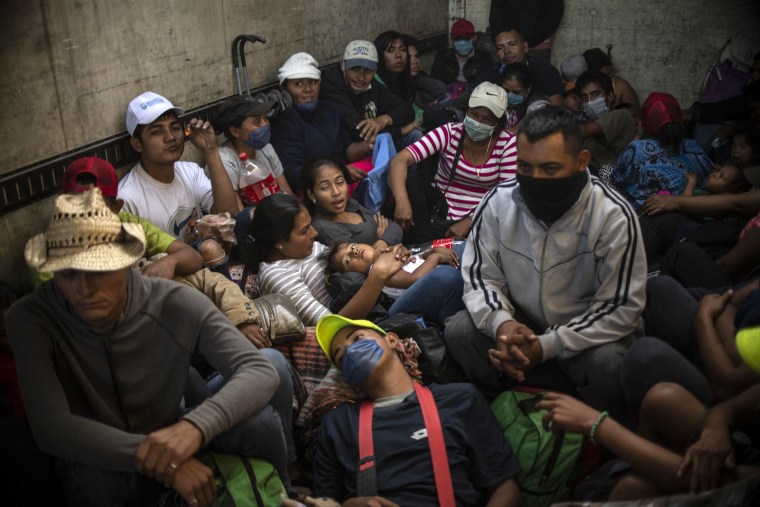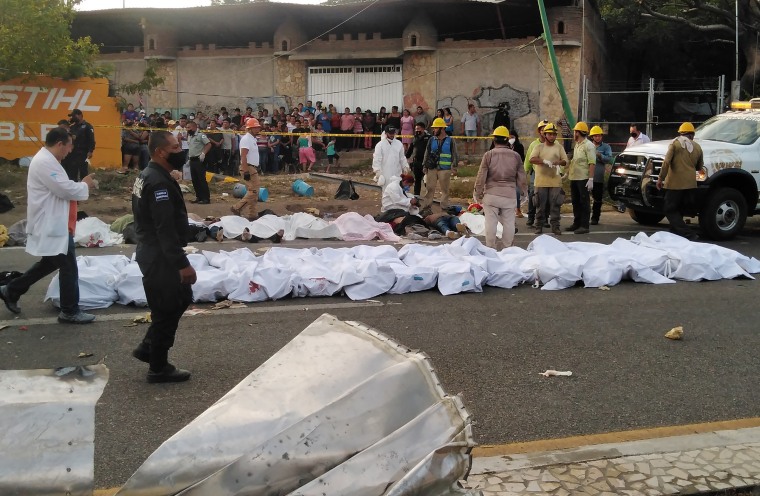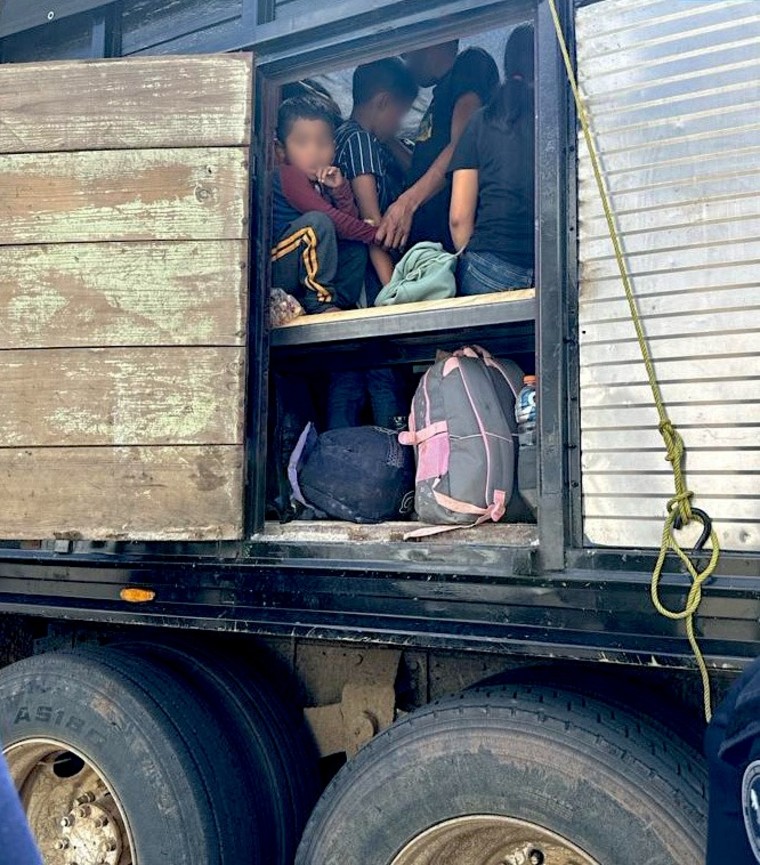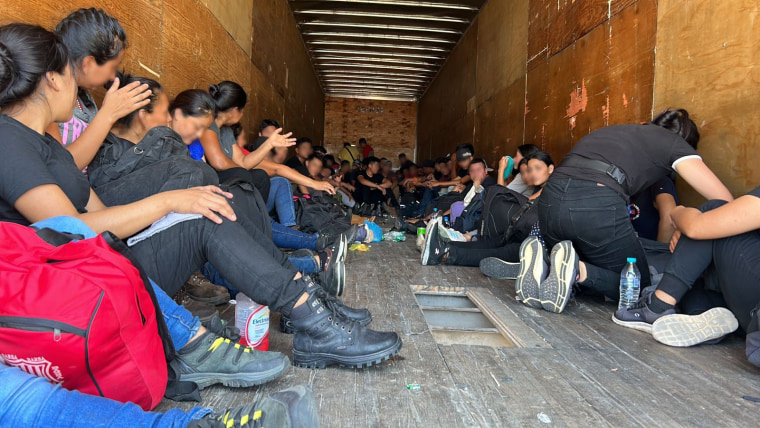By Ronny Rojas and Àngela Cantador (CLIP)
District courts in Mexico have records for only 35 human trafficking convictions between 2018 and October 2023, according to data from the General Directorate of Judicial Statistics. This number stands out in a country where almost two million undocumented migrants were intercepted in the same period, and where at least 19,000 migrants were trafficked illegally in inhuman conditions inside 172 cargo trucks, according to Telemundo News and the Latin American Center for Investigative Journalism (CLIP) and other media partners.
In those six years, Mexico's Attorney General’s Office opened 105 investigations on human trafficking aboard trailers and trucks. The majority of cases were closed, although the Prosecutor’s Office did not report outcomes for each of these.
Experts see these figures as proof of the ineffectiveness of Mexico's legal system. They believe this exemplifies the impunity with which smuggling gangs operate, and how vulnerable this makes migrants who are victims of crimes, as well as the families of those who have lost their lives attempting to reach the US border.
How can the families of the victims expect justice in a country with a rate of impunity so high and one that affects the majority of its citizens? This was the question on Tonatiuh Guillén López's mind, former commissioner at the National Migration Institute (INM), during an interview with Telemundo News and the Latin American Center for Investigative Journalism (CLIP).
“There is absolute impunity here. Our legal institutions, particularly the prosecutors’ offices, barely function or do not function at all,” Guillén said, who headed the INM for six months between 2018 and 2019.

The data backs the former official’s claims. In 2022, for example, only 4% of the more than two million investigations on all types of crimes by the Attorney General’s Office ended in court, that is, with the approval of a judge that there was enough evidence to bring the accused to trial, according to a report by the public policy analysis center México Evalúa, published last October. But in fact, no arrests were made in 87 out of every 100 investigations opened that year, according to that same study.
This NGO has documented the Mexican criminal justice system's slowness since 2017, and it claims impunity has reached 90% on average or above, which means the system’s institutions only solve 10 out of 100 crimes that are committed. The center says it considers the authorities to be “not very efficient.”
“Though the flow of cases entering the system — that is, those that are known to authorities — is enormous, the width of the pipeline of cases that ultimately result in an indictment, or that are channeled toward alternative mechanisms, is minimal,” the report points out.
Guillén believes that one of the biggest problems in the Mexican legal system is how deficient the investigation stage is, which results in poorly argued cases that fail when they come before a judge. According to México Evalúa, there is also a lack of resources and trained personnel, and the system suffers from poor coordination between prosecutors’ offices and police forces.
[A deadly journey: How truck drivers and the cartels profit from the migrant crisis]
One of the groups that remains most defenseless are migrants who are victims of crimes, mistreatment and abuse, according to experts consulted by an alliance of journalists led by Telemundo News, together with the Latin American Center for Investigative Journalism (CLIP), Pie de Página and its allies Chiapas Paralelo in Chiapas, En un 2x3 from Tamaulipas, and journalists in Veracruz, Contracorriente in Honduras, Plaza Pública in Guatemala, ICIJ in the Dominican Republic and Bellingcat, which investigated the dangerous industry of smuggling migrants on cargo trucks through Mexico.
One of the most dramatic cases occurred on the outskirts of Tuxtla Gutiérrez, in the state of Chiapas, in December 2021, when 56 people died after the overcrowded cargo trailer they were traveling in crashed into a bridge while driving over the speed limit.
More than two years have passed since the accident, and the investigation into human trafficking is still open. There have been no convictions or results to comfort the families of the victims. Three of the four alleged coyotes detained by Mexican police were freed without charges while a fourth is still under investigation, according to a lawyer who requested his identity be protected.
Yesenia Valdez, comprehensive legal defense coordinator at the Fundación por la Justicia y el Estado, which offers counseling to migrants in Mexico who have been victims of crimes, claimed that throughout her years working on cases like these she has encountered all types of failures: omissions during interrogations, roadblocks in accessing files and deficiencies in procedures, which she considers obstructions to investigations.
[A deadly journey: How truck drivers and the cartels profit from the migrant crisis]
“When you analyze the files you realize there are large gaps in investigations, in procedures that should have been done from the beginning but were not,” Valdez said, who has worked with relatives of the victims of the San Fernando massacre, in Tamaulipas, when 72 migrants died at the hands of the Zetas cartel in 2010.
Valdez does not hide her suspicions that some of these problems could be related to cases of alleged corruption in judicial officials.
“It would seem that (the proceedings) were not carried out because of a lack of knowledge, but when you look at the files, you realize that that’s not it, it’s that someone is being shielded, something is being hidden,” the lawyer said, without mentioning any specific case.
The level of corruption that Mexicans perceive from criminal justice authorities has increased in recent years, while their trust in police, prosecutors and judges –one of the critical factors behind the legitimacy of authorities and how willing people are to report crimes– has eroded, according to the NGO México Evalúa. State and municipal police, judges, the Public Ministry and local prosecutors are considered the most corrupt government bodies, according to the México Evalúa study.

The price of speaking up
Reporting a crime as an immigrant in Mexico is not without its risks. Many travelers who are victims of crimes choose not to speak out. In addition to administrative hurdles, or whether for fear of reprisals by criminal groups or for fear of being deported if they go to the authorities, their priority continues to be reaching the United States, Mónica Oehler explained, an expert migration researcher at the Amnesty International Mexico City office.
“Wasting time making a complaint, which means going through all the bureaucratic processes that happen in Mexico, well, it’s not something that's very appealing to them, they don’t know how to do it,” Oehler said. “It doesn’t even go through their minds when you ask them, ‘Did you report any of this?.’”
In spite of the fear and the lack of knowledge about the Mexican legal system, between 2016 and 2023, just over 6,000 migrants reported to Mexican authorities that they had been victims of a crime during their journey through Mexico. Almost half suffered robberies; three out of 10 reported being victims of human trafficking; and more than 700 reported being victims of kidnapping, according to official data from the Mexican Ministry of the Interior.
[Crimen organizado extorsiona a transportistas para obligarlos a traficar con migrantes]
In the case of human trafficking in cargo trucks, the states where the most people are transported in cargo trailers are also the ones where the fewest investigations are opened into this crime. In Veracruz, Chiapas and Nuevo León, for example, are the states where authorities have detected the most trailers – at least 106 cases – and where the most migrant deaths occurred on these trips between 2016 and 2023, according to our analysis. But in Veracruz, the Attorney General's Office only opened three investigations into human trafficking aboard trailers, while in Chiapas and Nuevo León there is no record of any federal investigations, according to Attorney General’s Office.
The data shows that between 2016 and October 2023, the country’s district courts only handed down 35 convictions for human trafficking. In another 36 cases, the defendants were acquitted or dismissed.

“It is very rare that (human trafficking complaints) are made, and it is very rare that the Institute adheres to the legal process,” Guillén explained. From his time as commissioner, he said he remembered “extreme” situations that reflect the network of complicity and the complexities that plague Mexican institutions.
One of the cases Guillén recalled happened in Veracruz, in 2019, when National Migration Institute agents intercepted a truck that was transporting people illegally. The INM officials filed a complaint with the Veracruz Public Ministry and when they wanted to follow up on the accusation, “it became complicated for very strange reasons,” Guillén recalled. “It was then reversed, and the Institute’s agents were the ones threatened by the Public Ministry and the State Police for having carried out an incorrect procedure.”
“Instead of the Public Ministry correcting this failure, it doesn't do so and decides to ignore this trafficking incident and not present the (detained) people. This situation of starting as the offended party and ending as the offending party" is an indicator of the environment in which agents operate, Guillén added.
The second hurdle that migrants who are victims of a crime, or who witness a crime, have to face is the lack of immigration mechanisms that allow them to stay in Mexico and participate in the legal process. Current immigration law says that every person who has been a victim of a crime is entitled to receive a Visitor Card for Humanitarian Reasons (TVRH), a document that allows them to stay in Mexico legally for up to a year.

However, few travelers know how to request this card: “It’s a reality that once a person leaves the immigration station, they do not receive any type of support or legal guidance to regularize their immigration status. They just release them to fend on their own,” Axel González, lawyer at the Ibero-American University Refugee Clinic, explained.
Yesenia Valdez, comprehensive legal defense coordinator at the Fundación por la Justicia y el Estado, agreed with this assessment, and stated that the National Migration Institute “never” provides legal support to migrants. “They don’t even explain to people what their options are to regularize their status,” she said.
Telemundo News and its partners asked the National Migration Institute about these criticisms and it has not responded yet.
The Fray Matías Human Rights Center shared this assessment: “The only mechanism (to regularize their status) is to ask for refuge. But we don’t even understand it,” Brenda Ochoa said, who was director at the center until recently. She emphasized that changing and poorly standardized bureaucratic requirements cause a lot of confusion for travelers.
[AMLO admite que “hay una red de tráfico” de migrantes en tráileres que viajan a la frontera]
The center cited problems like the fact that immigration authorities stationed at the Guatemalan border are not seeing refugee applicants – according to the United Nations High Commissioner for Refugees, applicants have a right to submit a refugee application at an immigration agency – but instead are referring them to the office of the Mexican Commission for Refugee Aid (Comar) in Tapachula, Chiapas, located more than 12.4 miles (20 kilometers) from the border.
But those same authorities do not allow them to enter the country, Ochoa explained, but rather “practically induce [migrants] to cross irregularly through the river to get through.”
And if migrants manage to reach the Comar office, they find out that they can only be seen with an appointment, she said. “They steer them towards another route that is also a wall, it's a bureaucratic situation because there is a huge backlog of applications,” Ochoa explained.
“There is no certainty, only constant uncertainty.” A concern that the International Organization for Migration (IOM) detected through surveys carried out of migrants at the border between Mexico and Guatemala, between April and May 2023.
According to a report published by this organization, some of the reasons that led travelers to approach Mexican institutions during the period surveyed were precisely to request information about the regularization process and the procedure for obtaining visas, and to find information on safe passageways through Mexico.
The Fundación por la Justicia y el Estado warns that in recent months, the INM is requiring more documentation from migrants to grant them this card, like that they be registered as victims before the Executive Commission for Attention to Victims (CEAV), something that is not stipulated by law, according to lawyer Yesenia Valdéz, comprehensive legal defense coordinator of the Fundación por la Justicia y el Estado. “They are asking for more requirements when (immigration) law establishes that they should only be recognizing them as a victim,” Valdez explained.
The Fundación por la Justicia y el Estado warns that in recent months, the INM is requiring more documentation from migrants to grant them this card, like that they be registered as victims before the Executive Commission for Attention to Victims (CEAV), something that is not stipulated by law, according to lawyer Yesenia Valdéz, comprehensive legal defense coordinator of the Fundación por la Justicia y el Estado. “They are asking for more requirements when (immigration) law establishes that they should only be recognizing them as a victim,” Valdez explained.
To justify these measures, the INM has hid behind a rise in forgery of these processes and bad practices carried out by the Public Ministry: “It’s an aberration, because if they detected any act of corruption, what they should do is ask the Prosecutor’s Office to investigate, not ask more requirements from migrants,” Valdez said.
“From the government, nothing”
Two years after the Chiapas incident, Sandra Coc Mohulds De Yat, who is originally from Guatemala, claims she and other migrants involved have not received any support or compensation from the Mexican government. She and her family decided they couldn’t wait any longer. This family’s life, which started in Rio Dulce, in the department of Izabal, was cut short on December 9, 2021, when the trailer in which Coc Mohulds’ husband, brother, and brother-in-law were traveling in overturned on the outskirts of Tuxtla-Gutiérrez, in Chiapas.
A few hours after the accident, her husband called her to tell her what happened. He and Coc Mohulds’ brother survived. Her brother-in-law, whose name appears on the list of the 56 people who perished that afternoon, did not suffer the same fate.
Very soon, mourning for the loss compounded with concerns for how the family was going to sustain itself, as the physical and emotional toll the accident left on Coc Mohulds’ relatives became evident: “My brother, unfortunately, can no longer work. He was just not OK, the accident affected him quite a bit. My husband was also injured, his arm, but thank God he recovered. It took six months for him to recover (physically), but emotionally almost a year,” she explained.
Given the lack of support from Mexican authorities, Coc Mohulds and her family decided to seek legal counsel in Mexico to fight for financial compensation from the Mexican government, since her brother can no longer work due to his injuries, as well as for her brother-in-law’s death. They later gave up on the idea. “We didn’t file any complaint because the truth is, there was no, no… we couldn't find what to do at the time,” she explained.
[Localizan a migrantes abandonados en autobuses en una carretera de Veracruz]
In 2018, the Mexican Government paid compensation for the deaths of undocumented migrants in Mexican territory, unprecedented til then. An amount that was not disclosed was given to the relatives of five people who died and one survivor, all from Ecuador, of the San Fernando massacre. In total, 48 people were compensated, the head of the Commission for Attention to Victims of Mexico (CEAV) at that time, Sergio Rochín del Rincón, announced.
As Rincón explained to the press, the compensation was determined “in accordance with international standards on the matter due to moral damage, loss of profits and support for funeral expenses when necessary.”
“It’s been hard on us,” she confessed, and claimed that throughout the process, the only support that her injured relatives received was first aid at the scene of the accident.
“Medical care, yes, sir. But economically, no. Nothing, nothing, not even to help us, no one. We managed to bring them here however we could. The good-hearted people here raised money to go and bring them (...) From the government, nothing,” she said.
“They (the institutions) are not going to protect you, unless it’s an exception. That’s not their thing,” Guillén concluded.
This investigation was conducted by Telemundo News and the Latin American Center for Investigative Journalism (CLIP, in Spanish), together with Pie de Página and its allies Chiapas Paralelo, En un 2x3 Tamaulipas, and reporters in Veracruz, Plaza Pública in Guatemala, Contracorriente in Honduras, ICIJ in Dominican Republic and Bellingcat.
Read our collective investigation in English and in Spanish. See our investigative series, Trailers, trap for migrants.